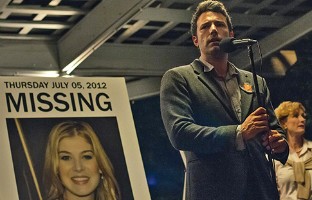Marriage on the edge

Gone Girl, both the book which has sold 8.5 million copies and the movie, has touched a nerve. As I settled into my seat to watch the film with a friend, clusters of women chatted around us. I realized that the movie had inspired many girls’ nights out.
Using the unscientific method of listening to theater murmurings, I learned several things about the audience. First, most of the women had read the book and knew what to expect. Second, most of the men in the audience had not read the book, and the plot took them by surprise. Finally, the women in the theater shared a subtle current of delight over the agency of the main character.
Read our latest issue or browse back issues.
Ben Affleck and Rosamund Pike star as the gorgeous Nick and Amy Dunne. The story opens on their fifth anniversary, when Nick comes home and finds evidence of violence in his living room. His beautiful wife is missing.
Gone Girl seems to be the story of a husband who has killed his wife and is trying to get away with it. Certainly Nick is no angel. As the couple’s story emerges we learn that he’s been inattentive, indifferent, and even cruel to his wife. He has misspent money, ignored Amy’s social isolation, and even had an affair (Emily Ratajkowski). But midway through the film the theory of Nick’s guilt is abruptly challenged.
Amy is smart, unflinching, and sociopathic. Gillian Flynn, who wrote both the book and the screenplay, deftly shows the significance of a person’s perceived image. Amy’s image of herself is, at least in part, based on a fictionalized persona. When she was a child her parents wrote a book series with an “Amazing Amy” heroine. Years later Amy still lives in the shadow of that character. As the plot progresses, we see that both Amy and Nick live out false images of themselves.
Flynn’s brilliance is in placing Nick and Amy’s fictional marriage on the teetering edge between ordinary marriages and evil ones. Her married readers and viewers are right on that cliff with Nick and Amy. We identify with the normal difficulties of their married life. We know that image plays a role in marriage and that behind closed doors things can shift. And we know that we can’t fully know our own partners—there’s a part of another human being that is always a mystery. When the story reveals the evil next to the mundane, the audience feels the rush of both recognition and horror.
This juxtaposition is encapsulated in the dialogue. “You’re delusional,” Nick says to Amy. “I mean, you’re insane. . . . I loved you, and then all we did was resent each other, try to control each other. We caused each other pain.”
Amy—cold and beautiful—smiles and says, “That’s marriage.”
And the audience laughs. We laugh because part of that is true. We laugh because it’s horrifying and because we are related to this couple and because we’re not this couple.
Flynn is a darkly feminist Stephen King, writing thrillers that center on women who’ve been twisted by a misogynistic world. Flynn has been accused of hating women. I disagree. She presents the truth of what can happen to women in a world that diminishes them. She nudges that truth just past reality—far enough for the women in the theater to sit at a safe distance from it but near enough that a hidden part of our psyches can cheer for Amy.
This dark portrayal of gender and relationships makes Gone Girl riveting.






